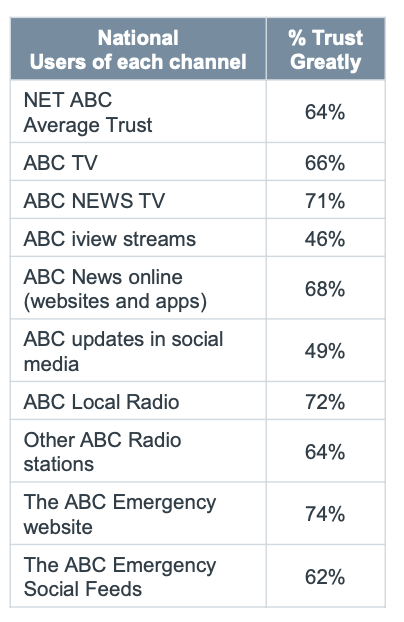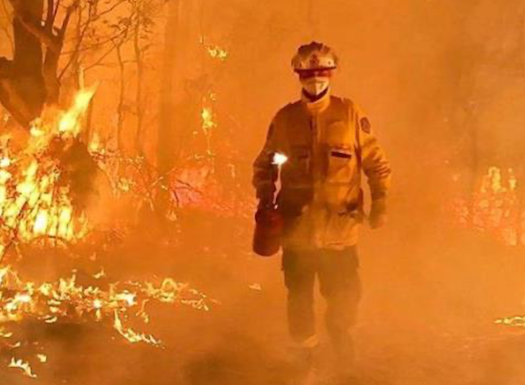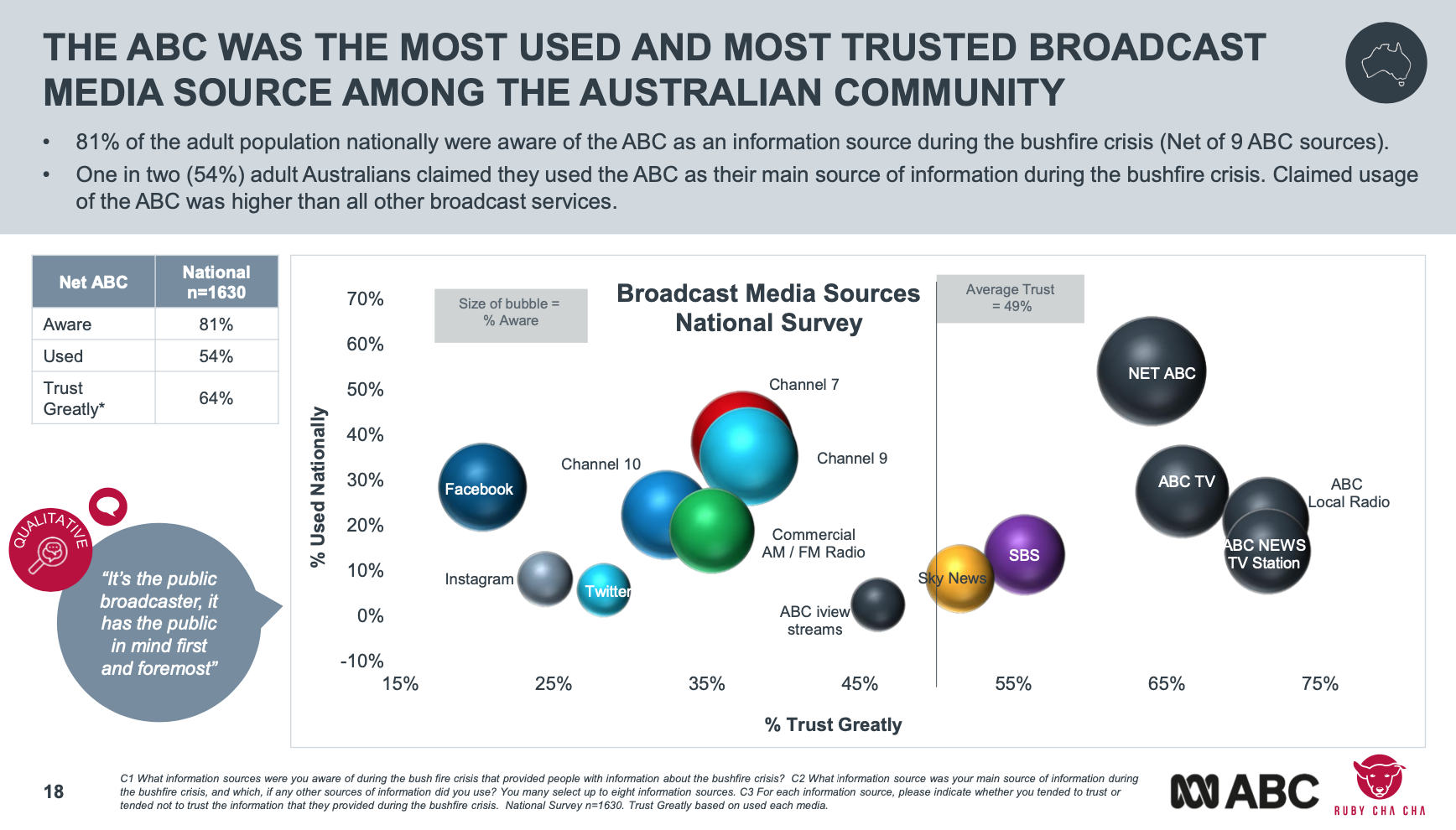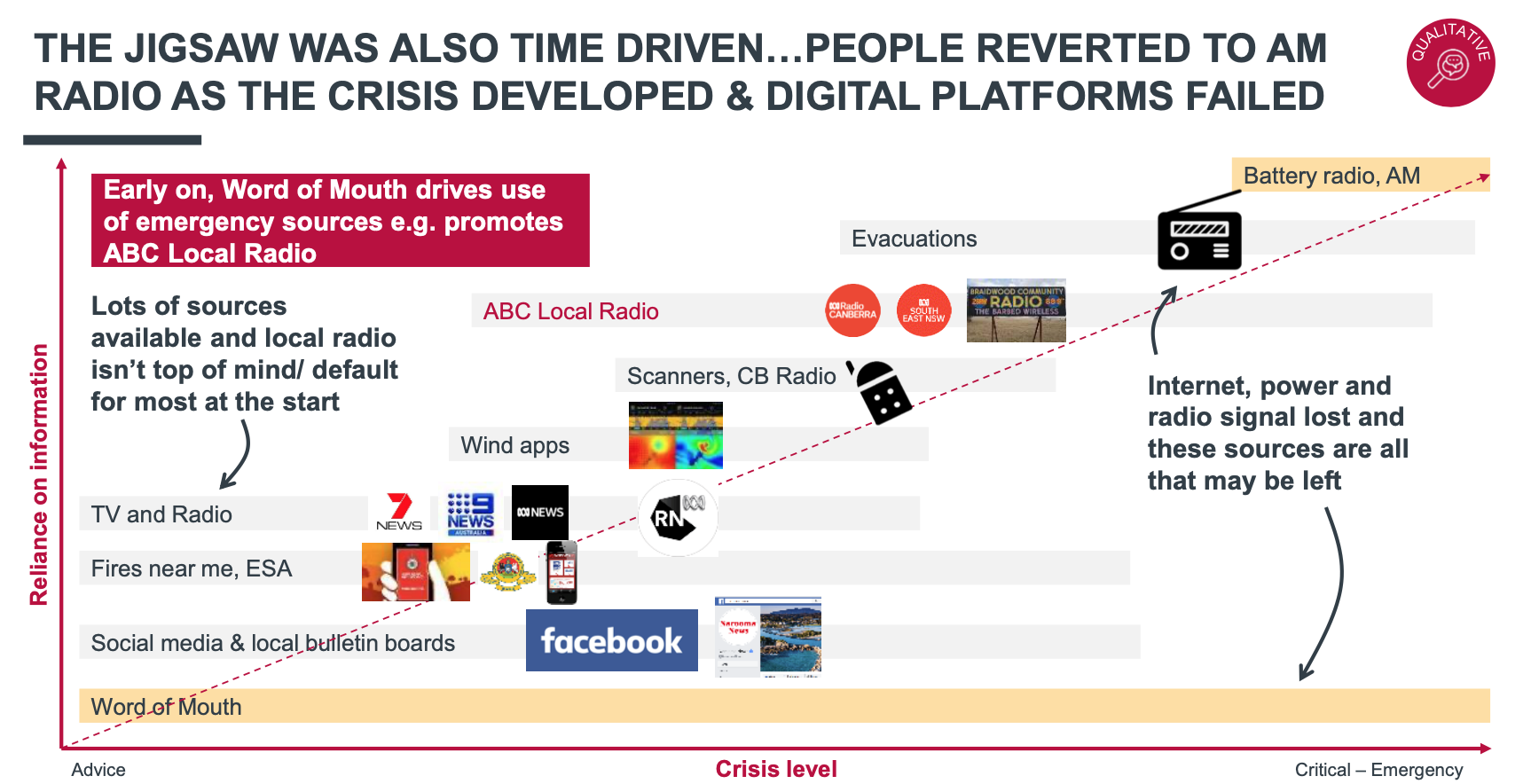As the Bushfire Royal Commission continues, the ABC has released independent research that shows Australians turned to the national broadcaster in record numbers during the recent bushfire crisis.
The research shows that the ABC was the most trusted information source during the fires and that lives were saved as a result of people acting on information the ABC provided.
At the height of the bushfire crisis (31 December-14 January) ABC Sydney and ABC NSW local radio produced 296 hours of rolling/continuous fire coverage, ABC Gippsland 134 hours, and ABC Melbourne 83 hours.
The Bushfire Impact Research was conducted by strategic market research and planning agency Ruby Cha Cha, between 17-27 March 2020. It found that the ABC was the most used and most trusted broadcast network during the crisis (click chart to enlarge).
In an analysis of trust, the ABC Emergency website was the most trusted source of information during the fires (74%), closely followed by ABC Local Radio (72%) then ABC TV News (71%). Social media was the least trusted of all media. Many respondents considered social media to be the fastest medium, but trust was low because the information on socials was not always accurate.

During the crisis period, the ABC undertook emergency broadcasting for over 200 emergency events across the country. Emergency Services apps were well regarded, although they were not always available when power or cell towers were down. When digital services and telecommunications failed, ABC Local Radio was the only way to access timely information, according to findings in the survey.
While trust and use of ABC Local Radio was high overall, the research found that awareness of how to listen to ABC Local stations on free to air broadcast radio was low with those under 50 years of age. The research report recommended: “The ABC needs to build awareness of the ABC Local Radio and educate the community on how to listen (i.e. station frequencies) in the event of an emergency. The awareness program should focus on those under 50 years who are less likely to use ABC Local Radio.” It also recommended that radio announcers should also talk more about wind speed and direction when reporting progress of fires.
As the crisis hit affected areas and other services went down, the research found that battery powered radios and word of mouth were the only main sources of information remaining (click to enlarge)
The researchers asked participants ‘what if there was no ABC?’ Answers included:
“We would lose the voice that cares the most.” David, Narooma
“Without the ABC there would be a level of disquiet, bordering on social unrest.” Lyndsay, Evacuation Centre, Narooma
“It would be a strategic nightmare – we would lack the most important information to help us in a time of need.” Shanna, Narooma
Half (50%) of the Australian adult population reported to have been impacted by the bush fire crisis, with one in ten surveyed (10%) directly impacted by the fires. 54% of those surveyed were evacuated or experienced personal loss during the fires, 44% of respondents reported effects on their health and 28% had to change or cancel travel plans.
At least one in four (28%) Australians claim to have acted on information from the ABC in some way to ensure the personal safety or safety of others. ABC News Online was the most trusted news website.
Seven out of ten (73%) Australians nationally acted on ABC information as a result of hearing an emergency broadcast or from anything else they saw on the ABC. Action was higher among the bushfire affected.
Survey respondents also identified ways the ABC could improve its emergency coverage, including listing the towns affected, more localised coverage, more exact fire locations, better knowledge of Australian geography and town pronunciations. It confirmed the view that “ABC Local Radio should be the lead emergency platform.”
The research highlighted the importance of raising awareness of the ABC’s emergency broadcast channels and digital services and the need for improved information on radio frequencies to enable people to source ABC Local Radio as it provides the most up to date and reliable information. The ABC intends to work with all levels of government and the emergency services to inform the community about these services.
ABC Radio’s reliance on signal and transmission towers also means it is critical that this infrastructure is funded, maintained and operational during a bushfire crisis.
The research consisted of a15-minute quantitative survey involving 1630 respondents from a nationally representative sample of Australia’s adult population (aged 18-75 years). An additional quantitative survey involving 373 respondents was conducted in parallel among Australians living in postcodes affected by the bushfires during December 2019/January 2020 with a small qualitative sample of 16 bushfire affected residents interviewed in a mix of face-to-face and zoom technology formats.
The ABC’s research has been submitted to the Royal Commission into National Natural Disaster Arrangements.
Subscribe to the radioinfo daily flash briefing podcast on these platforms: Acast, Apple iTunes Podcasts, Podtail, Spotify, Google Podcasts, TuneIn, or wherever you get your podcasts.







The following fire areas have ABC local radio on high powered FM not AM: Sunshine and Gold Coasts, Armidale, Richmond Tweed, Grafton/Kempsey, Manning River, Illawarra, Upper Hunter Valley, Bateman's Bay/Moruya (burnt down in the fires), Upper Murray, Latrobe Valley. At lower power Bombala, Walcha, Tumut in NSW and Cann River, Orbost, Corryong, Mallacoota, in Victoria. The ABC is under the illusion that the main capital city transmitters will cover the whole state which is patently untrue. Also local radio is supposed to be local to that location!
Our industry including the ABC is yet to take up Emergency Warning Functionality which is a capability of DAB+ (transmitted in capital cities) and DRM digital radio standards. In an emergency it can wake up radios in the affected area, sound an alert signal to wake up listeners, announce the warning, display a map of the affected area, display an indexed detailed text display for multiple fire locations, and could also cause vehicle navigation systems to recalculate the route around closed roads.
Unfortunately there is only one DAB+ radio in stores which can display more than a single line of scrolling text.
Since all FM transmitters, mobile phone base stations, Wireless NBN and VHF communications base stations are always at on the top of hills they are vulnerable to fire and wind damage as is the electricity line to power them. A better solution is to install a high powered high frequency (SW) transmitter in the centre of Australia which can broadcast to the whole of Australia and only switch on affected areas as required. In addition this transmitter could transmit ABC Grandstand and ABC Newsradio to the whole of Australia including the 470,000 remote Australians who loose all radio once they are mobile. The centre of Australia is away from all threats including cyclone, tsunamis and fire.
FACT: ABC is mandated as national emergency broadcaster.
FACT: Emergency personnel and others with emergency information, are MANDATED BY LAW to talk to the ABC.
FACT: Once these busy people have spoken to the ABC they won't talk to other local news media.
FACT: When approached by other local news media, people central to the crisis tell reporters, "We've already spoken to the ABC. Go get your information from them."
FACT: ABC WILL NOT SHARE INFORMATION IN A TIMELY MANNER TO LOCAL REPORTERS AND MEDIA. (Probably because ABC is trying to protect the inevitable Walkley win for emergency coverage)
FACT: ABC is NATIONAL and does not broadcast LOCAL information to local areas, in a timely manner - THUS ENDANGERING LIVES.
FACT: Local commercial media literally pulled ABC out of the fire during the emergency by lending them equipment, including space on transmission towers.
FACT: ABC actually CLOSED many local regional news rooms during the bushfires and centralized broadcast from large, mostly capital city, centres.
FACT: The ABC needs to take a good hard look at the truth behind their so-called community engagement and not believe their own warped press, including the above article.
FACT: ABC should put these comments through their precious little Fact-checker app, and lift their game a LONG way before anyone who deals with them during an emergency, ever regards them as trustworthy.
I am not surprised that many under 50 years old do not know about AM. The ABC constantly promotes listing on the App which is via the unreliable mobile phone network, and now TV as well.
The smart speaker is also a problem in emergencies because it uses the NBN which in towns of <10,000 people is distributed from mobile phone towers and in cities Fibre to the Node can even fail if the power fails in your street. In Capital cities DAB+ digital radio has been broadcast in most cities for 11 years but the ABC does not promote its use despite the fact there is over 5 million receivers.
“The ABC needs to build awareness of the ABC Local Radio and educate the community on how to listen (i.e. station frequencies) in the event of an emergency. The awareness program should focus on those under 50 years who are less likely to use ABC Local Radio.”
This is not required for digital radio as radios are tuned on the name of the broadcaster. Many under 50's have grown up on FM including JJJ and now streaming.
AM has almost disappeared in Europe being replaced by DAB+ digital radio and now FM is also disappearing as well. The EU & the UK have mandated that all new cars must be able to receive digital terrestrial radio.
DRM digital radio has covered all of India and can also be tuned by broadcaster name and can cover from the whole of Australia down to a local area. DAB+ is only suitable for areas of large population densities and as a result is not suitable for country areas.
As a result there are only a few AM radios in stores mostly in clock radios which by their nature are not very sensitive. So where the ABC local radio coverage is on FM, if it is burnt down as in Bateman's Bay, the AM transmitter is very weak in that area.
Big bushfires cause lightning according to the Royal Commission evidence that causes loud crackling sound in AM reception which does not occur in FM and digital radio making it hard to hear.
The ABC radio coverage area maps http://reception.abc.net.au/ are nearly 50 years old. In AM the noise from power lines, switchmode power supplies which are in LED lighting and almost every electrical and electronic product, and in vehicles (except Diesel) as well as the removal of the long metal telescopic car radio antenna has greatly reduced the coverage area on AM. This applies to commercial AM radio as well.
The coverage area reduces with the dryness of the soil, and many bushfires occur during droughts!
Their FM and digital radio coverage area maps are not accurate as well as they don't show blackspots as does https://myswitch.digitalready.gov.au/ does for television. This 3D digital map and propagation calculator can be used for digital radio and FM.
Dear Mr St John,
With reference to the last paragraph of your comment 5th June 0103, you have been "crusading" for a DRM high-power SW transmitter in Central Australia and when there are no emergencies, to transmit Newsradio.
I have mentioned elsewhere on this site, about a demonstration of a DRM broadcast from NZ being received in Spain, https://www.youtube.com/watch?v=kkD01FuXOsg . There was also a comparison of the DRM broadcast with the AM SW broadcast. Clearly DRM trumps AM SW for clarity. Youtube is replete with DRM demonstrations. Search DRM. One video shows how to build a DRM using software radio, https://www.youtube.com/watch?v=KREAagOXKi8.
The distance between Spain and NZ is approximately 20 thousand kilometres.
It follows that DRM transmission may well work given the distance between Alice Springs and other cities are considerably less. (as the aeroplane flies).
Thank you,
Anthony of exciting Belfield